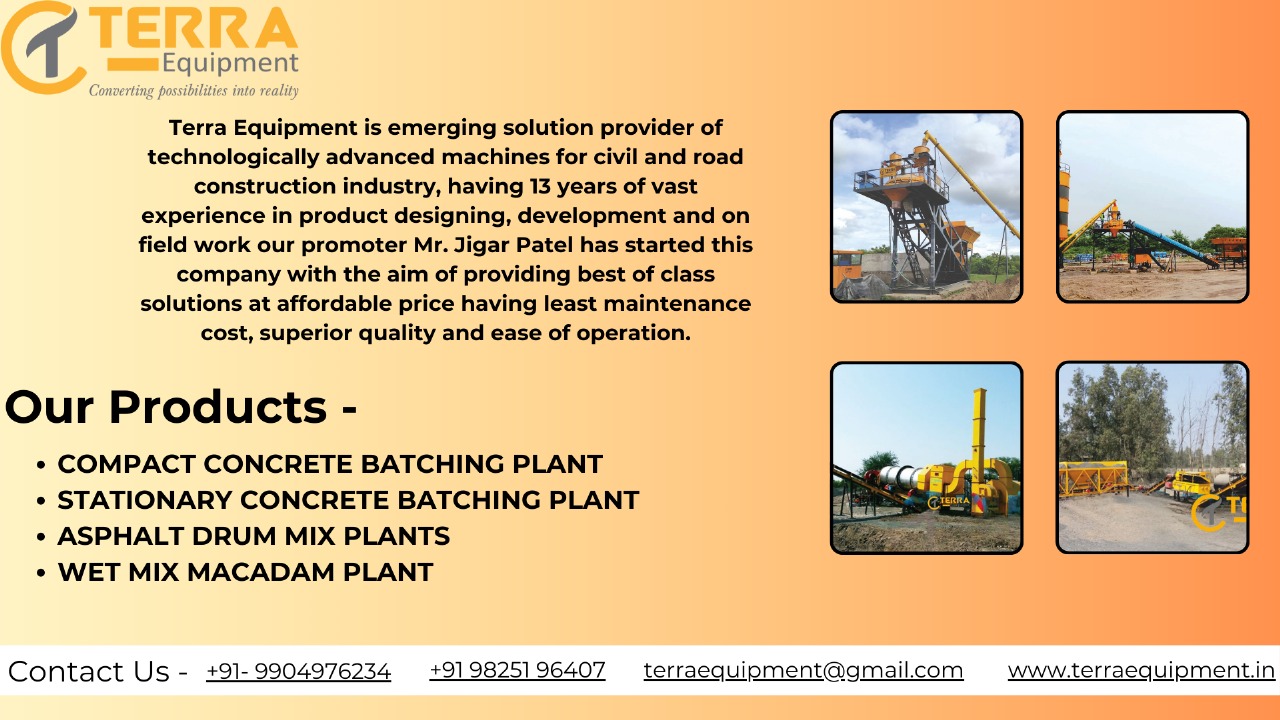Compact Stationary Concrete Batching Plant
A CompactStationary Concrete Batching Plant is a fixed yet space-efficient facility
designed for the precise production of concrete mixtures. It is engineered to
combine aggregates, cement, water, and additives in accurate proportions to
produce high-quality concrete. Unlike mobile plants, it is installed
permanently at a project site or concrete manufacturing hub. Despite its fixed
structure, it requires minimal space, making it ideal for urban or
limited-space installations. These plants are equipped with advanced control
systems for automation, ensuring consistency, speed, and precision in concrete
production.
Top 10 FAQs of Compact Stationary Concrete Batching
Plant
- What is a compact stationary
concrete batching plant?
It is a concrete mixing plant installed at a fixed location, designed to occupy minimal space while producing concrete efficiently. - How does it differ from a
standard stationary plant?
A compact plant has a smaller footprint and modular design, making it easier to install and manage in constrained areas. - What are the main components
of the plant?
It includes a mixer, aggregate batching system, cement silo, screw conveyor, water and additive dosing system, and control panel. - What type of mixer is used?
Typically, twin shaft or planetary mixers are used for high-efficiency and homogeneous mixing. - What is the production
capacity range?
Compact stationary plants generally range from 20 m³/hr to 120 m³/hr, depending on the model. - Is the plant automated?
Yes, it features semi-automatic or fully automatic control systems using PLC and SCADA. - Can different concrete
grades be produced?
Yes, the system can be programmed to produce various grades like M20, M25, M30, etc. - Is it suitable for
continuous production?
Yes, it is ideal for consistent and uninterrupted concrete production over long periods. - Can it be relocated if
needed?
Though stationary, its modular design allows for disassembly and relocation with moderate effort. - What power source does it
use?
Typically powered by electricity, but diesel generators can be used as backups or in remote areas.
Applications of Compact Stationary Concrete
Batching Plant
- Infrastructure Projects
(bridges, tunnels, overpasses)
- Precast Concrete
Manufacturing Units
- Industrial Construction Projects
- Metro Rail and Railway
Infrastructure
- Road and Highway
Construction
- Dams and Reservoir
Construction
- Airport and Seaport
Development
- Ready Mix Concrete (RMC)
Business
- Power Plants and Energy
Infrastructure
Benefits of Compact Stationary Concrete Batching
Plant
- Space Efficiency:
Designed for installation in space-constrained environments. - High Production Accuracy:
Automated systems ensure precise ingredient mixing and dosing. - Superior Concrete Quality:
Homogeneous mixing improves strength and durability. - Low Operational Cost:
Minimal maintenance and optimized layout reduce energy and labor costs. - Flexible Design:
Modular structure allows customization and ease of expansion. - Environmentally Friendly:
Enclosed structure reduces dust and noise pollution. - Time Saving:
Rapid setup and efficient mixing shorten construction timelines. - Consistent Performance:
Ideal for long-term projects requiring continuous concrete supply. - Easy Maintenance:
Centralized control system and accessibility make it easy to maintain. - Ideal for RMC Businesses:
Provides consistent, high-volume output for commercial ready mix concrete supply.
Contact us more details:
Call: +91 98251 96407 +91- 9904976234
Email:
terraequipment@gmail.com
Address: Survey No- 231, Dediyasan
Village, Opp Lilaba Weigh Bridge , Mehsana -384002 Gujarat.

